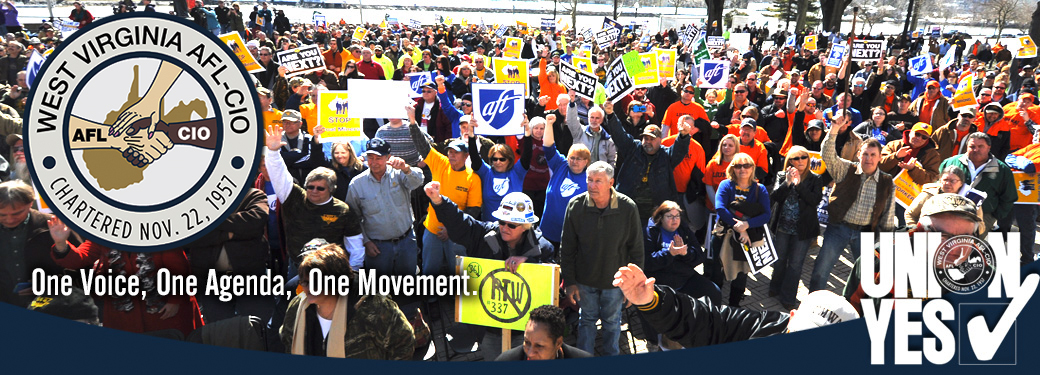Recent Press
- A Statement on the Passing of Former Delegate Doug Skaff
- Press Conference Wednesday Regarding Broadband Expansion Kickoff
- Ceremony Monday to honor WV workers who died on the job
- Press Conference Thursday on WV Federal Employee Job Cuts
- Rally in Support of IAM Local 598 Dow employees
- Join a Labor Day Celebration!
- COCA COLA: NOT TOO REFRESHING TO THEIR BECKLEY BRANCH EMPLOYEES
- WV AFL-CIO Mourns the Passing of Former Delegate Ron Fragale
- Teamsters Overwhelmingly Reject Contract
- Letter Carriers annual Stamp Out Hunger food drive Saturday
- Letter Carriers annual Stamp Out Hunger food drive Saturday
- Ceremony Sunday to honor WV workers who died on the job
- Statement from WV AFL-CIO President Josh Sword regarding Senate Bill 841
- A statement regarding Senate Bill 841 to cut unemployment benefits
- Cutting Earned Unemployment Benefits is Wrong
- WV AFL-CIO devastated at sudden passing of former President Kenneth Perdue
- A statement from West Virginia AFL-CIO President Josh Sword regarding Senator Joe Manchin’s decision to not seek re-election to the U.S. Senate
- Join a Labor Day Celebration!
- Ceremony Friday to honor WV workers who died on the job
- Teamster Members Unanimously Authorize Strike At Coke
- The PEIA Cost Shifting Bill (aka SB 268)
- Public Employee Representatives to Discuss Sweeping PEIA Legislation
- Union leaders’ statement on Senate PEIA bill
- Workers Will Rally for Fair Treatment at Italian Opera-Themed Tecnocap Celebration
- A celebration of former WV AFL-CIO President Jim Bowen's life Sunday
- Details
CHARLESTON -- Kanawha Valley residents can help fight hunger in the region by simply placing non-perishable food donations by their mailboxes on Saturday, May 9, that will be collected by letter carriers and distributed locally to those in need.
“Many of our neighbors, including seniors, veterans and children, go hungry every day,” noted Letter Carrier and Charleston resident Cathy Jones. “For 22 years, letter carriers across the country have organized this effort to help food pantries stock their shelves, and to increase awareness of this ongoing problem.”
- Details
wvgazette.com
HARLESTON, W.Va. (AP) – The West Virginia AFL-CIO will hold a ceremony at the state Capitol to remember workers who died on the job last year.
The 27th Workers Memorial Day ceremony is set for noon Tuesday. Local and state workers and union representatives will attend the ceremony in front of the West Virginia Coal Miner Statue.
West Virginia AFL-CIO President Kenny Perdue says the event will honor 17 West Virginians who died at work in 2014.
- Details
CHARLESTON -- To celebrate the completion of a new apartment building designed to provide the physically disabled with independent living accommodations, representatives of several groups that contributed to its design and construction held a ceremonial ribbon cutting today.
“This project provides some much-needed, centrally located living space for people who face physical challenges,” West Virginia AFL-CIO President Kenny Perdue noted.
Named in honor of longtime attorney Patrick Maroney -- who through his work as General Counsel to the WVAFL-CIO and as a state and community leader has dedicated decades of service on behalf of fair housing and employment -- the Thomas Patrick Maroney Unity Apartments contains 13 one-bedroom accessible apartments, which include kitchens and bathrooms designed to accommodate people with mobility challenges.
- Details
I must admit, at the outset of the 2015 regular legislative session, I was taken aback by the outright hostility and disrespect directed toward working people and the unions who represent them. I was troubled by opinion pieces in Charleston newspapers from a coal industry/big business representative, a corporate labor attorney and a former legislator that not only included untruths, but in a few instances, base mean-spiritedness.
But in the end, I’m grateful.
When faced with that reality, and the realization that the majority of legislators in office right now favor large corporate interests over the well being, safety and way of life of the middle class and working poor, West Virginians turned out by the thousands at the state Capitol March 7.
They demanded that the truth be told about a bill with the word “Safety” in the title that instead reversed mine safety regulations, and legislation called “Right to Work” that would lower wages and limit options in the workplace.
- Details
West Virginia AFL-CIO President Kenny Perdue said the decision by household products leader Procter & Gamble to invest $500 million in a West Virginia manufacturing facility is testament to the strong, viable workforce and economic opportunities the state provides.
“Companies like Procter & Gamble have every reason to want to locate in West Virginia, despite what some lawmakers and other interest groups have been saying about our state,” Perdue said.
He said the announcement once again brings into question the need for legislation to enact a so-called Right-to-Work law and other measures that would negatively affect workers.
“Some have said such bills would eliminate road blocks that are keeping companies from locating in West Virginia, but clearly those road blocks don’t exist,” Perdue said. “In the name of ‘economic development,’ they are talking about rolling back a prevailing wage law that ensures fairness, training of a highly skilled workforce, and quality construction, and of enacting a Right-to-Work law that would needlessly weaken the employer-employee relationship by adding government interference.
